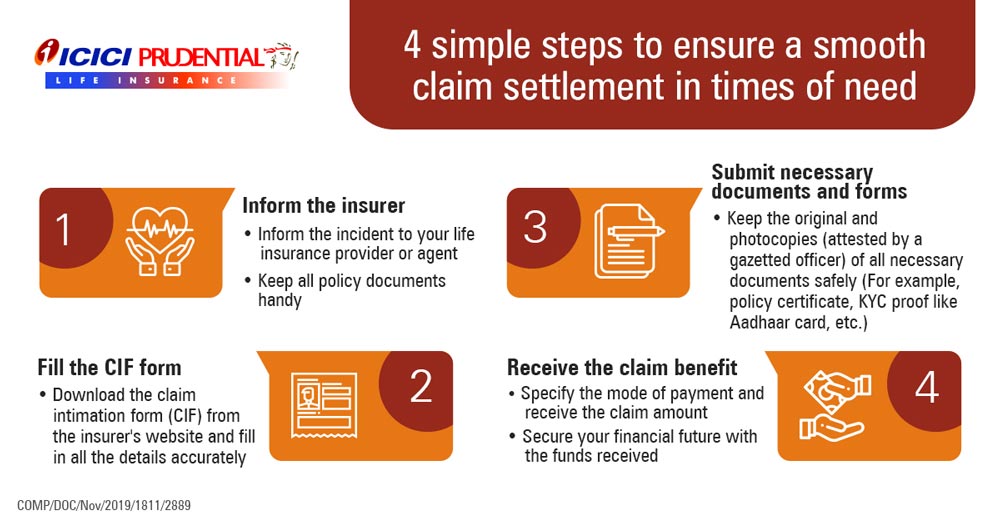Life Insurance - Meaning
Life Insurance can be defined as a contract between an insurance policy holder and an insurance company, where the insurer promises to pay a sum of money in exchange for a premium, upon the death of an insured person or after a set period. Here, at ICICI Prudential Life Insurance, you pay premiums for a specific term and in return, we provide you with a Life Cover. This Life Cover secures your loved ones’ future by paying a lump sum amount in case of an unfortunate event. In some policies, you are paid an amount called Maturity Benefit at the end of the policy term.
There are two basic types of Life Insurance plans -
- 1. Pure Protection
- 2. Protection and Savings
What is Pure Protection Plan?
A Pure Protection plan is designed to secure your family’s future by providing a lump sum amount, in your absence.
What is Protection and Savings Plan?
A Protection and Savings plan is a financial tool that helps you plan for your long-term goals like purchasing a home, funding your children’s education, and more, while offering the benefits of a Life Cover.
Factors that affect life insurance premium
Now that you know what is life insurance and why you need it, find out the factors that can affect the life insurance premium:
Age:
One of the prime factors that affect the premium for a life insurance plan is your age. The life insurance premium is lower for younger people and gradually increases with ageGender:
Studies have shown women live longer than men1. Therefore, the life insurance premium is lower for women as compared to menHealth conditions:
Your present and past health conditions can determine the premium for your life insurance plan. If you have any pre-existing illnesses or have suffered from an illness in the past that may resurface or affect your present health, you would be charged a higher premiumFamily health history:
The chances of suffering from a disease that runs in your family are considerably high. So, if any hereditary illnesses run in your family, you may have to pay a higher premiumSmoking and drinking alcohol:
Lifestyle habits like smoking and drinking alcohol can impact your health and lead to multiple health issues. Therefore, insurance companies charge a high premium for individuals who smoke or drink alcoholType of coverage:
The type of coverage you opt for can increase or decrease the life insurance plan’s premium. If you add any riders to your plan, the premium would increase. A longer policy term can also result in a higher premium compared to a shorter term. In addition to this, the type of life insurance plan you select also impacts the premium. For instance, term life insurance is the most affordable form of life insuranceAmount of coverage:
A higher sum assured would result in a higher premium and vice versaOccupation:
If you work in a high-risk job, the premium for your life insurance plan would be higher than others. For example, if you work in construction or if your job puts you at any kind of risk, such as regular exposure to chemicals, the insurance company will charge a higher premium
COMP/DOC/Dec/2021/3112/7177
What are the benefits of having Life Insurance?
Life insurance can offer several benefits to you and your loved ones, including the following:
Financial Security
Wealth Creation
Tax benefits
When you buy a life insurance policy, the insurance company charges a premium in exchange for providing financial security to your beneficiaries in case of an unfortunate event of death. The proceeds from life insurance can be used by the beneficiaries as an income replacement to cover day-to-day expenses.
Some life insurance plans offer you the option to invest and grow your money. This enables you to stay financially prepared for your future needs. Life insurance can offer good returns and income.
Life insurance plans offer multiple tax$ benefits. The premiums paid towards a life insurance plan are deductible up to ₹ 1.5 lakh per annum under Section 80C$ and the maturity benefits are also tax-free subject to conditions prescribed under Section 10(10D)$ of The Income Tax Act, 1961.
COMP/DOC/Apr/2023/104/2751
Let us understand some commonly used terms in Life Insurance:
- Life Assured: It is the person who is covered under the insurance policy
- Proposer: It is the person who pays the premiums of the policy. For example: If you have bought the policy for yourself, then you are both the Life Assured as well as the Proposer. Similarly, if you purchase an insurance policy for a family member, then you are the proposer and the family member is the Life Assured.
- Nominee or Beneficiary: It is the person you appoint at the time of buying the policy to receive the benefits of your insurance policy, in your absence.
- Insurer: The insurance company that sells the life insurance policy is called the Insurer (for example, ICICI Prudential Life Insurance).
- Life Cover: It is the amount that the Insurer will pay to your Nominee in case of an unfortunate event.
- Maturity Benefit: For Protection + Savings policies, the Insurer pays a certain lump sum of money on completion of the policy term. This amount is known as the Maturity Amount.
- Premium: A premium is the amount you pay to the insurer for receiving the benefits of the insurance policy. These payments can be made on a regular basis throughout the policy duration, for a limited number of years or just once, as per the options available under the policy you choose.
- Premium Payment Term: The number of years for which you pay the premiums is known as the Premium Payment Term.
- Policy Term: The number of years for which the Life Cover continues.
Let us understand how Life Insurance works:
In today's era, having a life insurance policy is a must for every individual as it is one of the best ways to secure one's future along with their loved ones. There are many different types of life insurance policies available in the market. However, before choosing one, it is important to understand how a life insurance policy works. Let us look at an example to understand how life insurance works:
Now, let’s see an example:
Mr. Kumar (Life Assured) pays ICICI Prudential Life Insurance (Insurer) an annual amount (Premium) over 5 years (Premium Payment Term) to make sure that his wife (Nominee) gets a certain assured sum of money (Life Cover) in case of an unfortunate event during the 10 years or Lumpsum amount at maturity on survival at the end of policy term.
Life insurance not only covers the risk arising due to an unfortunate event, but also gives you additional benefits like tax benefits, savings and wealth creation over a period of time. The right life insurance plan from a trusted company can help one get long-term risk cover plus savings, i.e. dual benefits from one solution.
COMP/DOC/Sep/2021/249/66267
People like you also read ...






